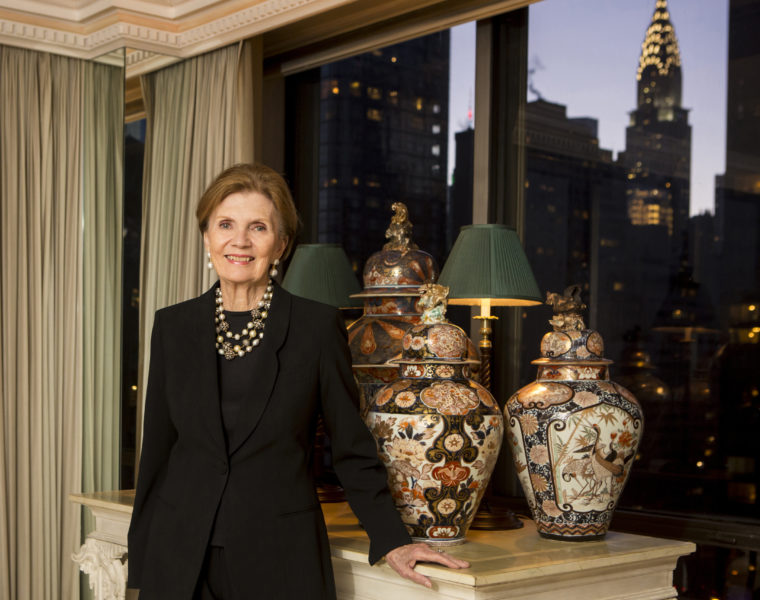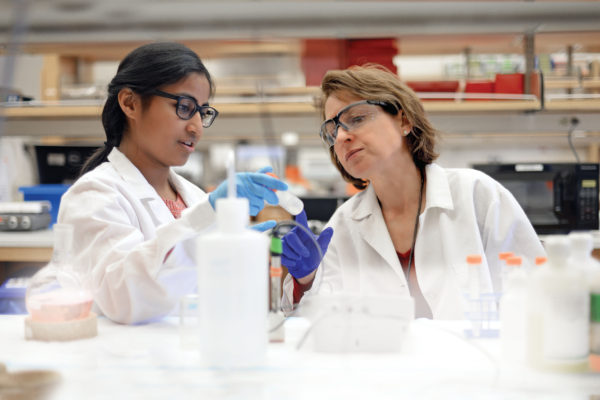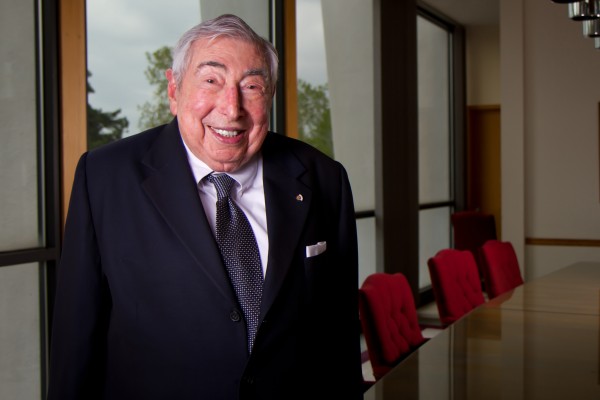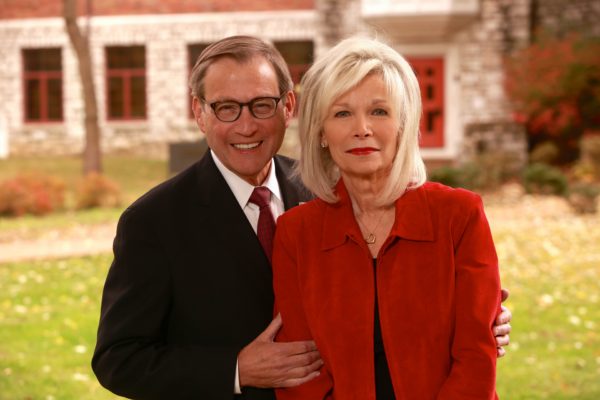When Jane Hardesty Poole, AB ’61, was a young girl, her father taught her how to knit. The celebrated St. Louis ophthalmologist trained himself from a book. It was an unusual thing for a father to do in the 1940s. But John Hardesty, MD, was no ordinary man.
A longtime professor of ophthalmology at Saint Louis University, Hardesty pioneered the systemic use of epinephrine to treat glaucoma in 1934. He provided free eye care throughout the St. Louis region and advocated for laws to benefit the blind. And as a member of the U.S. Army Medical Corps serving with the British Army’s Seaforth Highlanders during World War I, he risked his life to treat soldiers on the front lines and help plan the escape of several officers from a prisoner-of-war camp in Germany.
Poole adored her father. “My mother told me one of his patients came in and asked about me once,” she says. “My father replied that when he kissed my hand, I curled it up and said I was never going to wash it.”
Hardesty’s death in 1953, when Poole was 14, affected her deeply. But it wasn’t until years later that she realized how much he influenced her life’s path, particularly her decision to leave St. Louis and pursue a career instead of marriage after her graduation from Washington University — an unconventional choice at the time.
“My father provided the unconditional love that every child needs,” she says. “He gave me the confidence and courage to move to New York City with few friends, no job, no place to live and very little money. I hand it all to him.”
An adventurous life
In 1961, when Poole earned her bachelor’s degree in political science, about 6 percent of American women had completed four or more years of college. Most of her friends were married by age 20. Her mother insisted she finish her degree. “She wanted me to be able to take care of myself no matter what happened in life,” Poole says.
With her education complete, Poole sought excitement — and a job — in the Big Apple. Her first position as a salesperson at Saks Fifth Avenue came just as she was running out of money. She went on to work as an assistant to a senior editor at Glamour magazine and as a secretary at Merrill Lynch, where she passed the test to become a licensed stockbroker on her first try. The brokerage houses were not ready for women in the late ’60s, she says, so she moved on to an interior design firm.
“Although I never found the perfect career, I learned something valuable from every one of those jobs, which helped when I went to work as a realtor in the mid-1980s,” she says.
Poole loved being single in the city. Her busy social life included dinners, theater outings and galas. A Life magazine photo of her taken during this time is displayed in her Midtown Manhattan apartment.
“I went out with all kinds of people because they were interesting,” she says. “I had a terrific time.”
Although she had no intention of marrying until she was 40, Poole fell in love with F. Harrison Poole, an executive with Philip Morris. They married in 1972, when she was 33, and their daughter, Josephine, was born in 1976. Poole’s husband’s position as vice president and treasurer required him to travel across the country and to Europe, and she enjoyed accompanying him.
Poole’s passion for travel grew even further after she married her second husband, Robert Bendheim, a philanthropist and retired president of a textile manufacturing firm. Together, they toured countries around the globe. Since Bendheim’s death in 2009, Poole has taken many trips with friends.
Another passion, collecting 16th- and 17th-century Japanese Imari porcelain, was fueled by her travels. She acquired her first piece in Japan in 1971 and began expanding her collection in 1984 during excursions to London to scour antique shops. The hobby opened doors to friendships with antique dealers and museum curators. She has since donated 16 vases to the Metropolitan Museum of Art. “I’m thrilled and astounded that my pieces will be displayed in the museum,” says Poole, who was told she is the only American collecting this type of pottery.
A legacy of generosity
Poole’s philanthropy extends well beyond her porcelain. She contributed her father’s papers and military memorabilia to the Missouri History Museum. And she has made significant gifts to Ability Beyond, a nonprofit that provides residential living and employment programs and other services to adults with developmental disabilities. Her daughter resides in one of the agency’s group homes.
“My father was known for helping patients who could not pay. He gave freely of his time and resources. I like to think I got that from him.”
— Jane Hardesty Poole
Just as she attributes her strength and courage to her father, Poole credits him for her generosity. “My father was known for helping patients who could not pay,” she says. “He gave freely of his time and resources. I like to think I got that from him.”
A desire to honor her father led her to establish the John F. Hardesty, MD, Distinguished Professorship in Ophthalmology and Visual Sciences at Washington University School of Medicine in 2011. In 2017, she made an additional $10 million commitment to support the department. In recognition, it will be renamed the John F. Hardesty, MD, Department of Ophthalmology and Visual Sciences at a dedication ceremony in September 2018.
These gifts have helped Poole reconnect with her alma mater. She is a member of Washington University’s New York Regional Cabinet, and she frequently attends university events in the city. She also hosts receptions for students from the McDonnell International Scholars Academy, who visit New York every other spring.
“I have known Jane for many years,” Chancellor Mark S. Wrighton says. “She is a tremendously warm and giving person who is deeply committed to her family. Her remarkable generosity in honor of her father will extend and preserve his legacy and benefit the School of Medicine for generations to come.”
Poole had intended to provide funds for the professorship through her estate but changed her mind during a meeting with Chancellor Wrighton in 2010. “I realized it would be more fun to pay tribute to my father while I was alive,” she says. “Nothing has given me more joy. It’s my way of celebrating a man who shaped my life and gave so much to others.”
Mary Lee is director of development communications.




Comments and respectful dialogue are encouraged, but content will be moderated. Please, no personal attacks, obscenity or profanity, selling of commercial products, or endorsements of political candidates or positions. We reserve the right to remove any inappropriate comments. We also cannot address individual medical concerns or provide medical advice in this forum.